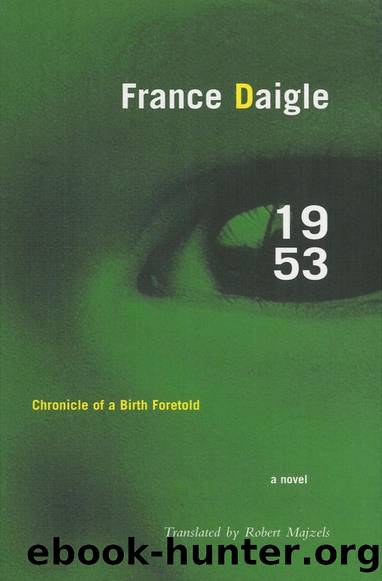1953: Chronicle of a Birth Foretold by France Daigle

Author:France Daigle [Daigle, France]
Language: eng
Format: epub
ISBN: 9780887846045
Amazon: 0887846041
Goodreads: 1745602
Publisher: House of Anansi Press Inc
Published: 2013-04-18T05:00:00+00:00
***
Like Scandinavia in Alfred Nobelâs time, the Moncton area and Acadia in general offered little to attract the attention of the world during the first half of 1953. In Moncton, the year began on a practical note with an increase in bus fares. The price of an adult ticket went from seven to ten cents, but a savings was offered at three tickets for a quarter. Children would henceforth pay five cents per trip, but six childrenâs tickets would cost only twenty-five cents. Until then, they had sold ten for the same price. The new fares came into effect on Wednesday, January 14, the day after Radio-Canadaâs Concerts du mardi broadcast Darius Milhaudâs Concerto no. 2, written for the violinist Arthur LeBlanc, and, in a Canadian premiere, played by the Acadian himself and accompanied by the Montréal Symphony Orchestra. During the first half of 1953, the violinist Arthur LeBlanc, the Acadian soldiers in Korea, and the Melanson triplets more or less accounted for Acadiaâs contribution to the international scene. As for the students of Saint-Joseph College who spent the winter rehearsing the Bourgeois gentilhomme, they went as far as Victoria, at the other end of the country, to participate in the Canadian Drama Festival, where they did win a prize, though not first place.
Life in Acadia was therefore quiet compared to the upheavals on the international front. When these events became too heavy to bear, one could always turn to the news briefs for a more human perspective on distant horizons. Two in particular captured the imagination of Baby M.âs mother. In Toronto, a father offered to exchange his eyes for a house for his wife and six children, who were living in a garage. The man found a buyer, but the blind buyer, who âknew what it was to be blind,â required only one eye from the unfortunate father, who had thought âblindness was preferable to poverty.â The other news brief was about a London cab driver who did not like foreigners and who was fined eleven dollars âfor refusing to accept an Arab sultan as a passenger.â The man later gave up driving a cab when he learned that the sultan in question had been-known to leave tips of 140 dollars.
Baby M.âs mother felt that a newspaper ought to deal with all facets of life, and enjoyed the fact that the entirely commonplace, such as an ad for Barbour products, appeared alongside the most extraordinary. It should be noted that Barbour provided something more or less universal, with its homogenized peanut butter, its prepared mustard, its jellied desserts in six flavours, and its double-action Acadia baking powder. Other advertisements punctuated the daydreams of energy-drained housewives: Cream of the West and Five Roses fought the flour wars, Domestic peddled its lard, Kraft its Parkay margarine, Magic its baking powder, and Fleischman its yeast. As for tea and coffee, Chase & Sanborn, Nescafé, Salada, and King Cole offered no less than the best. But when it came to beverages, no one could match the genius of the H.
Download
This site does not store any files on its server. We only index and link to content provided by other sites. Please contact the content providers to delete copyright contents if any and email us, we'll remove relevant links or contents immediately.
We Ride Upon Sticks by Quan Barry(34535)
The Secret History by Donna Tartt(19088)
Norse Mythology by Gaiman Neil(13363)
Crooked Kingdom: Book 2 (Six of Crows) by Bardugo Leigh(12318)
The Betrayed by Igor Ljubuncic(11859)
The Betrayed by Matthew Dickerson(11626)
Caraval Series, Book 1 by Stephanie Garber(10268)
Year One by Nora Roberts(9800)
Twilight Siege: A Dark Fantasy Novel (The Fae Games Book 2) by Jill Ramsower(9667)
Oathbringer by Brandon Sanderson(9624)
The Priory of the Orange Tree by Samantha Shannon(9098)
The City of Brass by S. A. Chakraborty(8877)
Red Rising by Pierce Brown(8785)
Confessions of an Ugly Stepsister by Gregory Maguire(7887)
Little Fires Everywhere by Celeste Ng(7200)
Iron Flame by Rebecca Yarros(6999)
This Is How You Lose Her by Junot Diaz(6886)
Shalador's Lady by Anne Bishop(6856)
Storm and Silence by Robert Thier(6842)
